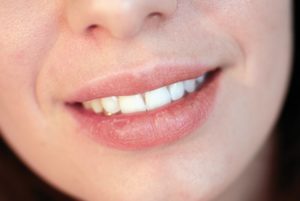How to Relieve Dry Mouth
July 14, 2019

Do you always seem to feel thirsty no matter how much water you drink? You may have dry mouth, a condition where the mouth doesn’t produce enough saliva. As if feeling dehydrated wasn’t bad enough, dry mouth can also cause tooth decay because there isn’t enough saliva to wash away excess particles of food and bacteria. How can you find relief from dry mouth in East Islip? Read on to learn some home remedies for this condition.
Do I Have Dry Mouth?
Common symptoms of dry mouth include:
- A dry or sticky feeling in the mouth
- Constant thirst
- Cracked lips or sores in the mouth
- Dry feeling in the throat
- Dry, red, raw tongue
- Bad breath
What Causes Dry Mouth?
Dry mouth can be caused by a number of different factors such as:
- Side effect of medications like antihistamines, antidepressants, and sedatives
- Side effect of certain diseases like diabetes, Sjogren’s syndrome, or Alzheimer’s
- Side effect of chemotherapy or radiation
- Nerve damage to the head or neck
- Dehydration
- Smoking or chewing tobacco
- Using recreational drugs such as marijuana or methamphetamines
How Can I Find Relief?
If you’re taking a medication that causes dry mouth, talk to your doctor about possibly switching to a different type or dose. Make sure to talk to your doctor first, as you should NEVER suddenly stop taking a medication without asking them if it’s safe. Your dentist in East Islip might also be able to help. You could be prescribed an oral rinse that can help stimulate the flow of saliva. If that doesn’t work, you can always try the following remedies at home to find some relief:
- When in doubt, drink more water.
- Suck on sugar-free candy or chew sugar-free gum. These can help stimulate saliva flow, but make sure they don’t have sugar. Otherwise they can increase your risk for tooth decay and gum disease.
- Breathe through your nose, not your mouth, as much as possible.
- Use a humidifier in a place where you spend lots of time, like your workspace or your bedroom.
- Quit smoking.
- Limit caffeine, which can dry out your mouth.
- Use alcohol-free mouthwash. Alcohol dehydrates you.
- Brush your teeth twice a day with a fluoride toothpaste.
- Floss every day.
Having dry mouth may not be the end of the world, but it’s still important for your oral health to seek treatment as soon as possible. Follow these tips and you can soon find relief.
About the Author
Dr. Gary Rosenfeld graduated from Columbia University Dental School in 1984, and has been providing above and beyond care to all his patients since then. Throughout the course of his career he has completed more than 1000 hours of continuing education, and has been honored by the New York State Dental Society for doing so. If you have dry mouth that doesn’t seem to go away, contact the doctor on his website or at (631)-581-8600.
No Comments
No comments yet.
RSS feed for comments on this post.
Sorry, the comment form is closed at this time.


